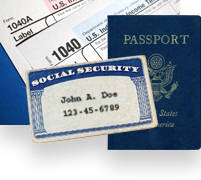Home | Your Identity
What ID Theft Affects
Many people think that identity theft only affects your credit. They couldn't be more wrong. Only 1 out of 5 identity theft occurrences involve the financial category. The rest fit in a much more dangerous group:
- Social security
- Driving record
- Medical records
- Criminal record
- Employment opportunities
- Your reputation
Can you imagine what would happen if someone had any of those documents in your name? The consequences of ID theft can be disastrous, last for months, and cost in the thousands. If an identity thief steals your information, you can wrongly be charged with thousands of dollars in medical bills, tax fraud or even be mistaken for a criminal. Not to mention, it can hurt your reputation in business and within your community.
There's no foolproof way to avoid having your identity stolen, but there are a number of precautions you can take to minimize your odds of being a victim. And most importantly, we are here to help you every step of the way with unlimited support. As a first measure, consider the following:
1. Monitor your credit report.
Many consumers don't even realize their identity has been stolen until they are denied credit due to information provided on their credit reports.
2. Don't give out personal information indiscriminately.
Before you give any personal information by mail, internet or telephone, confirm you are dealing with a legitimate organization.
3. Be careful with your mail.
Don't use an unsecured mailbox when mailing anything that contains financial information. Mail sensitive materials from a post office collection box or your local post office. Remove mail from your own mailbox promptly. And, if you're planning to be away from home, be sure to put a hold on your mail until you return.
4. Guard your trash.
Identity thieves have been known to gather personal information from trash. Before throwing them away, be sure to tear or shred your charge receipts, copies of credit applications, insurance forms, bank statements, and the credit card offers you get in the mail.
5 Only give your Social Security number when absolutely necessary.
There are legitimate reasons you will be asked for your Social Security number. Your employer and financial institution may need it for wage and tax reporting, and it's usually necessary whenever a credit check is required. Before giving out your number, be sure to ask why it's needed and how it will be used.
6. Pay attention to billing cycles.
If your bills don't arrive on time, follow up with creditors. A missing statement could mean an identity thief has taken over your account and changed your billing address.
7. Exercise caution online.
Before making any purchase via your computer, look for the icon of a lock in the lower right-hand corner of your browser window. If it's there, you're dealing with a secure site. If not, you'll be safer finding another merchant.
8. Remove personal information from old computers.
If you delete sensitive files by using your keyboard or mouse, the files may remain on your computer's hard drive where they can be easily retrieved. To make sure your files are unrecoverable, use a “wipe” utility program to overwrite the entire hard drive.
9. Always retain experienced professionals.
Just like you would always make sure to safeguard your health, family and personal property, so should you safeguard your identity. Contact ASPA today and let our world-class, Kroll-backed monitoring, consultation and restoration services go to work for you.
| © 2010 APSA International, LLC. All rights reserved. | Terms & Conditions | Privacy Policy | Site Map |





